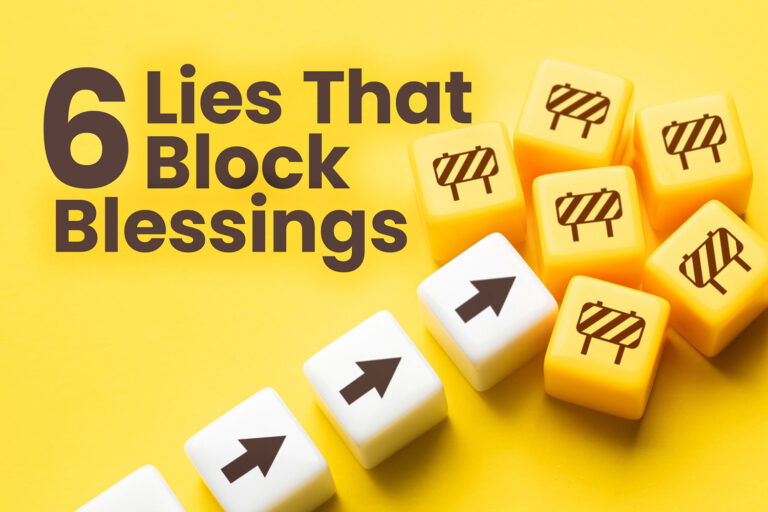A Divine 3-Point Plan for Rest When You Can’t Go One More Day
Just when you’re about to throw up your hands and yell, “I quit!” or walk out the door saying something you shouldn’t, or hang up on someone, or tap the Unfollow button…
First, realize there’s probably a better way to handle the situation—especially when heated frustration can so easily cloud our judgment.
Second, while you may feel like you’re at the end of yourself, you need to know you have a Friend, an Ally, Someone who’s ready to step in at a moment’s notice and help carry the load. Even more reassuring, that “someone” has been thinking what you’ve been thinking:
It’s time for a break!
“Heaven and Earth were finished, down to the last detail.
“By the seventh day God had finished his work. On the seventh day he rested from all his work. God blessed the seventh day. He made it a Holy Day because on that day he rested from his work, all the creating God had done.
“This is the story of how it all started, of Heaven and Earth when they were created” (Genesis 2:1-4, MSG).
Kenneth Copeland occasionally refers to a Bible study technique he uses when he’s digging into God’s Word, trying to understand something. It’s called the Law of First Mention. It simply means that when an idea or principle appears for the first time in Scripture, that first reference establishes a precedence. It becomes the filter through which you interpret subsequent references to the same idea or topic.
In this case, God got all His work done in six days, and on the seventh, He took a break. Notice, that’s “how it all started”—work, work, work, work, work, work…then, take a break. And that’s how God intended for it to continue, all the way down to today.
(Maybe TGIF—Thank God It’s Friday—was His idea to begin with?)
God gets us, and He obviously knows when enough is enough. Being the Father and Creator that He is, He has a way to get you the break you so desperately need while salvaging—even maximizing—all your relationships, your sanity, your finances and your dreams in the process.
You don’t have to give up, walk out, hang up or shut up anymore.
But you will have to step up, if you’re all in for the therapeutic regimen God has in mind for the most peaceful, restful, enjoyable—and highly productive—life you’ll ever live.
So, if you’ve grown weary and can’t imagine dragging yourself through one more day, take a timeout and consider God’s three-point plan for rest. It’s a big part of God’s strategy to not only keep you in the race, but also to put you in the lead!
Take a look at the regimen God prescribed for Israel nearly 3400 years ago, then consider how it can impact your world today.
Point No. 1: Take Time to Rest
“Remember to observe the Sabbath day by keeping it holy. You have six days each week for your ordinary work, but the seventh day is a Sabbath day of rest dedicated to the LORD your God. On that day no one in your household may do any work. This includes you, your sons and daughters, your male and female servants, your livestock, and any foreigners living among you. For in six days the LORD made the heavens, the earth, the sea, and everything in them; but on the seventh day he rested. That is why the LORD blessed the Sabbath day and set it apart as holy.” –Exodus 20:8-11
From the beginning of time (as the Bible measures it), God set seasons, cycles and time in motion. Day and night, summer and winter, seedtime and harvest (Genesis 8:22).
And from the moment God introduced Himself to His chosen people, Israel, at Mount Sinai, those seasons and cycles became central to their relationship.
After freeing Israel from 430 years of enslavement to Egypt, God met with them in the desert for some face time and to get acquainted. No. 4 on God’s short list of priorities for their future together (the Ten Commandments) was this idea of a weekly sabbath.
The Hebrew word shavat means “to rest.” God, in His wisdom, wanted His people—and eventually all mankind, livestock and cultivated lands—to rest. It was part of His regimen for a healthy lifestyle. God also intended for them to have quality focus time together during those sabbaths, all for the purpose of a healthy relationship.
The promise was—if Israel would do their due diligence and follow through with their part in this rest day—then they would find great joy and honor in the Lord, and He would give them the best of the best, as well as an inheritance (Isaiah 58:13-14).
Point No. 2: Take Time To Release
“Plant and harvest your crops for six years, but let the land be renewed and lie uncultivated during the seventh year. Then let the poor among you harvest whatever grows on its own. Leave the rest for wild animals to eat. The same applies to your vineyards and olive groves.” –(Exodus 23:10-12)
Basically, this was an expanded version of the weekly sabbath. It required a lot more on Israel’s part—more planning, more preparing, and more faith that they wouldn’t run out of food while they were busy resting (Leviticus 25:20-22).
But then God tacked on a surprising detail to this seventh-year sabbath:
“At the end of every seventh year you must cancel the debts of everyone who owes you money…. for the LORD’s time of release has arrived” (Deuteronomy 15:1-2).
With that, these seventh-year sabbaths became known to the Hebrew people as Shemitah years—years of “release,” or freedom, through the process of forgiving debt. It was like hitting a financial reset button.
And who couldn’t use that?
Point No. 3: Take Time to Restore
“‘You shall consecrate the fiftieth year and proclaim a release [freedom] throughout the land to all its inhabitants. It shall be a jubilee for you.’” –(Leviticus 25:10, NASB)
Much like the seventh-year sabbath (Shemitah), God required Israel to rest and forgive all debts. But what really set this jubilee year apart was that all land that had been bought and sold over the previous 49 years was now to be restored back to the original family, the original tribe of Israel to which it had been allotted (Leviticus 25:13).
Again, it was like doing a reset, but on steroids!
Now, rest, release AND restoration were all happening in one year. Imagine the people’s anticipation.
Once God set these sabbaths in motion—the weekly, the seventh-year and the 50th-year—the idea of rest became a major part of the Hebrew lifestyle and culture, how they lived, worked, interacted with one another and related to God.
Sadly, though, what got off to a great start didn’t end so well.
After generations of turmoil and failure surrounding these sabbaths, King David lamented how Israel did not approve, acknowledge or respect God’s ways—and all over something designed for their benefit (Psalm 95:10).
Ultimately, it was Israel’s unbelief, rebellion and disobedience that kept them from their rest, their inheritance and their Promised Land (Hebrews 3:19).
Today’s Rest
So, for a great idea to have ended in such heartache and disappointment, what could possibly be our takeaway for today’s world?
The writer of Hebrews gives us a clue:
“God’s promise of entering his rest still stands…. For this good news—that God has prepared this rest—has been announced to us just as it was to [the Israelites]. But it did them no good because they didn’t share the faith of those who listened to God. For only we who believe can enter his rest…. So God’s rest is there for people to enter, but those who first heard this good news failed to enter because they disobeyed God. So God set another time for entering his rest, and that time is today” (Hebrews 4:1-3, 6-7).
God is relentless. He’s faithful and never gives up on us!
When Jesus first stepped out on center stage of His ministry, He boldly “announced”—not just to Jews, but all mankind…
“The Spirit of the Lord is upon me…. to share the message of Jubilee” (Luke 4:18-19, TPT).
In that one word, Jesus was declaring:
Poor man, you don’t have to be poor anymore…sick woman, you don’t have to be sick anymore…bruised child, you don’t have to be bruised anymore!
I AM the Jubilee, and you can rest in Me…be released in Me…be restored in Me!
From that moment on, sabbath was no longer a particular day, a particular year or something you had to wait half a lifetime for. It was now. It was Jesus!
I am Lord of the Sabbath (Mark 2:27-28).
Come to Me and I will give you rest (Matthew 11:28).
Today, with the benefit of a few thousand years of hindsight, it’s easier to understand why our whole salvation experience is a “gift from God” (Ephesians 2:8-10). It’s something we can only receive. We could never work hard enough or long enough to earn or achieve it. That’s where we have to rest (trust) in God’s love and goodness toward us. Let Him do the heavy lifting.
Brother Copeland would be the first to tell you how years ago—in all the busyness of ministry, with weekdays flowing into weekdays—he got to place where he was violating the sabbath by preaching seven days a week and never taking time to rest. A couple of times it got serious enough that he nearly collapsed from working so much.
Then, as he tells it, “One day, God chewed me out pretty good. The LORD said, Kenneth, I’ve told you to rest 52 days a year. I also told you to start walking, and you didn’t!’”
In those few moments of a stern course-correction by God, it didn’t take Brother Copeland long to get into the Word and start working some new habits and healthier regimens into his life and ministry—especially at the prodding of Hebrews 4:10-11 (NIV):
“For all who have entered into God’s rest have rested from their labors, just as God did after creating the world. So let us [labor] to enter that rest.”
His takeaway was, when we truly rest, God can get busy working on our behalf, fulfilling His promises to us. But when we’re so busy working and doing everything ourselves—with very little exercising of our faith—that’s when God has to step back because His hands are tied. And you never want that!
The “labor” God expects from us is simply to do what it takes to keep the switch of faith turned on in our lives. When times are good, keep believing God. When times are tough, keep believing God.
So, don’t wait until you’re about to slam into another wall in life. Start setting time aside now to practice entering the rest, release and restoration God has for you. Disconnect from your daily and weekly grind and distractions, and focus on your caring Creator and faithful Father. Get in His Word, listen to His voice and take what He says seriously, being quick to obey Him.
Soon you’ll be like David: “By my God I can leap over a wall” (Psalm 18:29, AMPC).
Related Articles:
13 Radical Ideas To Ponder When You’re Backed Into a Financial Corner
© 1997 – 2025 Eagle Mountain International Church Inc., DBA Kenneth Copeland Ministries. All Rights Reserved.





